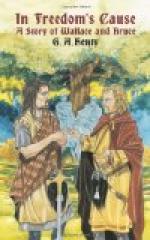The victory of Biggar still further swelled Wallace’s forces. Sir William Douglas joined him, and other gentlemen. A great meeting was held at Forest Kirk, when all the leaders of Wallace’s force were present; and these agreed to acknowledge him as general of the Scottish forces against England, with the title of Warden of Scotland.
King Edward was at this time busied with his wars in France, and was unable to despatch an army capable of effecting the reconquest of that portion of Scotland now held by Wallace; and as the English forces in the various garrisons were insufficient for such purpose, the Earl of Percy and the other leaders proposed a truce. This was agreed to. Although Wallace was at the head of a considerable force, Sir William Douglas was the only one among the Scottish nobles of importance who had joined him; and although the successes which he had gained were considerable, but little had been really done towards freeing Scotland, all of whose strong places were still in the hands of the English, and King Edward had not as yet really put out his strength.
The greater portion of the army of Wallace was now dispersed.
Shortly afterwards the governor of Ayr issued a notice that a great council would be held at that town, and all the Scotch gentlemen of importance in the district were desired to attend. Wallace was one of those invited; and deeming that the governor might have some proposition of Edward to lay before them, he agreed to do so. Although a truce had been arranged, he himself with a band of his most devoted followers still remained under arms in the forest, strictly keeping the truce, but holding communications with his friends throughout the country, urging them to make every preparation, by collecting arms and exercising their vassals, to take the field with a better appointed force at the conclusion of the truce. Provisions and money were in abundance, so large had been the captures effected; but Wallace was so accustomed to the free life of the woods that he preferred to remain there to taking up his abode in a town. Moreover, here he was safe from treachery; for he felt sure that although the English nobles and leaders would be incapable of breaking a truce, yet that there were many of lower degree who would not hesitate at any deed of treachery by which they might gain reward and credit from their king. Archie’s band were found of the greatest service as messengers; and although he sometimes spent a few days at Sir Robert Gordon’s with his mother, he generally remained by the side of Wallace. The spot where the Scottish leader was now staying lay about halfway between Lanark and Ayr.
Archie heard with uneasiness the news of the approaching council, and Wallace’s acceptance of the invitation. The fact that the Earl of Percy, a very noble knight and gentleman, had been but lately recalled from the governorship of Ayr and had been replaced by one of somewhat low degree, Arlouf of Southampton, still further increased his doubts. It seemed strange that the governorship of so important a town — a post deemed fitting for Earl Percy — should be bestowed on such a man, were it not that one was desired who would not hesitate to perform an action from which any honourable English gentleman would shrink.




